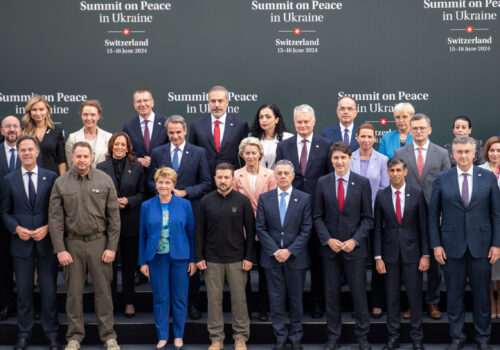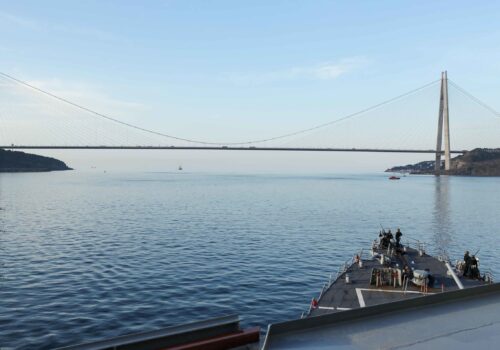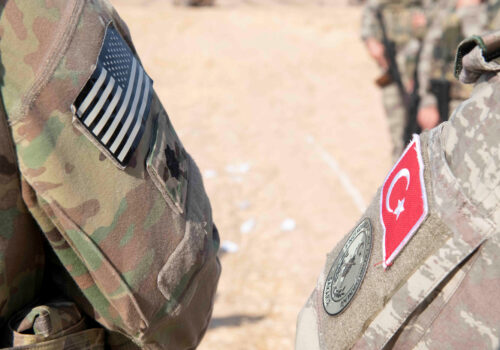A sea of opportunities: Main takeaways and policy recommendations
This is part of an report on the prospects for enhanced cooperation between Turkey and Western countries in the Black Sea region in the new geopolitical setting following Russia’s full-scale invasion of Ukraine.
Russia’s full-scale invasion of Ukraine in 2022 has challenged Turkey’s long-term strategy of multilateral diplomacy and regional ownership in the Black Sea. However, it has also created new opportunities for Ankara by highlighting the growing importance of the region—and Turkey as its key player—to the broader West.
The war in Ukraine has also marked a turning point in Ankara’s relations with the EU and NATO, as it can either act as a catalyst to bring Turkey back into the fold of the European politics or accelerate its alienation from the West and push Ankara even closer to Russia. To achieve the former and avoid the latter, it is important that Ankara’s Western partners recognize Turkey’s leading role in regional security and adopt a more inclusive approach that involves Turkey in shaping their policies toward the Black Sea region.
On the other hand, Turkey should acknowledge the benefits of such cooperation and constructively engage with the United States and EU to defend the rules-based order both regionally and globally. Whereas a significant departure from Turkey’s current stance is unlikely, a shift in approach is possible—especially in the Black Sea region, where the Turkish-Western policy convergence has grown since the invasion of Ukraine.
These policy recommendations represent a summary of key insights of the report as a whole, which includes four independent analyses covering political dialogue, defense cooperation, maritime security, and energy. For a more detailed examination of the authors’ individual conclusions, please refer to the respective chapters.
Political and diplomatic dialogue
Recommendations for Western partners
- Recognize Turkey’s aspiration to play a pivotal role in the Black Sea region. Leverage Turkey’s political and diplomatic clout in the region for mutual benefit.
- Engage Turkey in consultations to ensure better aligned and coordinated policies toward the Black Sea region.
- Harness Turkey’s mediation potential in Russia’s war on Ukraine.
- Support Turkey’s interest in normalizing relations with Armenia, facilitating a peace agreement between Armenia and Azerbaijan, and promoting stability in the South Caucasus through connectivity projects.
- Identify ways to reduce Ankara’s dependence on Russia by providing feasible alternatives through cooperation with the West.
- Work together to bolster NATO’s defense and deterrence capabilities in the Black Sea.
- Address grievances regarding the lack of recognition by its Western partners of Turkey’s security concerns in and beyond the Black Sea region.
Recommendations for Turkey
- Recognize that strategic autonomy must involve reducing Turkey’s dependence on Russia and address societal, economic, and security vulnerabilities that Russia exploits.
- Use the current security crisis in the region as an opportunity to reaffirm Turkey’s central security role in the Alliance, particularly in deterring Russian aggression in the Black Sea and on NATO’s eastern flank.
- Step up efforts to close the loopholes that allow Russia to circumvent Western sanctions, including the reexport of dual-use goods and technology to Russia, which has been in direct conflict with Turkey’s own interests as well as US and EU policies.
- Counter Russia’s influence operations in Turkey, which serve to amplify anti-Western narratives.
- Support multilateral projects aimed at enhancing Ukraine’s military capabilities, as well as recovery and reconstruction efforts, both bilaterally and in cooperation with the West.
- Establish new cooperation models in the Black Sea region that complement NATO activities and involve Bulgaria and Romania, with the possibility of including Ukraine, Georgia, and Moldova.
- Foster a more cooperative culture of engagement with Western partners. Work to renew a regular and structured foreign and security policy dialogue with the EU and achieve a broader normalization of relations with the United States.
Maritime security
Recommendations for Western partners
- Reaffirm adherence to the Montreux Convention, as the tendency to question its relevance contributes to Turkey’s concerns about the destabilizing consequences of broader US involvement in the Black Sea region.
- Commit to support the Mine Countermeasures Black Sea Task Group.
- Provide air control over the western Black Sea to reinforce Turkey’s naval posture vis-à-vis Russia and facilitate uninterrupted functioning of sea lanes of communication.
- Consider Turkey’s security concerns and sensitivities while developing a new EU Black Sea Strategy.
Recommendations for Turkey
- Leverage the potential of the Mine Countermeasures Black Sea Task Group to enhance Turkey’s relevance in regional maritime security and reaffirm its credentials as a primary maritime security provider.
- Support allied and partner countries (e.g., Bulgaria, Romania, and Ukraine) in upgrading their naval capabilities and developing maritime security action plans.
- Enhance shipbuilding cooperation (in particular, Ada-class corvettes) with littoral states. This would contribute to closer maritime cooperation and interoperability among Turkey, Bulgaria, Romania, and Ukraine.
Defense cooperation
Recommendations for Western partners
- Support defense industrial complementarity between other NATO members and Turkey, as well as between Ukraine and Turkey. Build on the positive trends that have emerged with the resumption of the F-16 deal and US-Turkish cooperation in production of artillery shells.
- Allocate part of US defense assistance to Ukraine to finance Turkish-Ukrainian projects.
- Pursue defense cooperation and joint defense production with Turkish partners—Georgia and Azerbaijan—as well as economic support to the development of the Middle Corridor.
- Suspend or eliminate spending policies that limit joint EU funding of non-EU producers of critical defense goods.
- Strengthen the capabilities of littoral NATO states in the region for air defense, naval defense/anti-ship missiles, and ground defensive capabilities to raise the costs of Russian revisionism to unsustainable levels.
- Avoid the temptation to work around Ankara when planning and resourcing security for the region. Instead, consult with Turkish officials during formulation of policies. Recognize Turkey’s lead in NATO operations in the Black Sea region.
- Address Turkey’s security concerns in a wider region—most critically, US support to the People’s Protection Units (YPG) in Syria, which Turkey considers a branch of the terrorist organization Kurdistan Workers Party (PKK).
Recommendations for Turkey
- Work together with the network of littoral NATO allies and non-NATO regional partners to strengthen multilateral deterrence of further Russian aggression in the region.
- Take advantage of diplomatic channels of communication with Russia to create openings for de-escalation and mediation between Russia and Ukraine, when conditions are ripe.
- Leverage Turkish conventional military power and its proven ability to train, equip, and coordinate with forces beyond its own borders to reinforce NATO’s defense and deterrence posture in the region.
Energy cooperation
Recommendations for Western partners
- Increase the capacity of TAP/TANAP from 16 bcm to 31 bcm to facilitate the transportation of non-Russian gas to Europe via Turkey, thereby enhancing the continent’s energy security and reducing reliance on Russian gas.
- Enable renewal of the Turkey-Greece interconnector to ensure continued support and normalization of energy relations.
- Complete the technical modifications of the Trans-Balkan Pipeline to enable its reverse-flow capabilities, facilitating the transport of natural gas from the south to the north.
- Enhance LNG supplies for Central European countries such as Slovenia, Hungary, and Bosnia and Herzegovina, using Turkish LNG infrastructure.
- Strengthen collaboration between the European Agency for the Cooperation of Energy Regulators and Turkey’s Energy Market Regulatory Authority to enhance regulatory frameworks and operational efficiency in energy markets. Conduct joint workshops, personnel-exchange programs, research projects, and capacity-building initiatives.
Recommendations for Turkey
- Expand Black Sea energy cooperation and broaden Turkish natural gas export agreements with Eastern and Central European countries in the Black Sea region, thereby diminishing Russian influence and solidifying Turkey’s role as an energy hub.
- Maximize production from the Sakarya gas field to increase natural gas supplies to Eastern and Central European countries.
- Prioritize the integration of small modular reactors in the Turkish energy system, targeting an additional 5 GW of capacity, to reduce dependence on Russian nuclear power.
- Enhance investments in renewable energy projects in line with the European Union Green Deal, including wind, solar, and green hydrogen.
- Use Turkey’s strategic position to develop and commercialize new natural gas routes from Turkmenistan, northern Iraq, and the Eastern Mediterranean.
Further reading

The Atlantic Council in Turkey aims to promote and strengthen transatlantic engagement with the region by providing a high-level forum and pursuing programming to address the most important issues on energy, economics, security, and defense.
Image: Turkish Defence Minister Yasar Guler, his Romanian counterpart Angel Tilvar and Bulgaria's Deputy Defence Minister Atanas Zapryanov attend a signing ceremony of a memorandum of understanding on establishing a mine countermeasures naval group in the Black Sea, aimed at clearing mines floating there as a result of the war in Ukraine, in Istanbul, Turkey, January 11, 2024. REUTERS/Umit Bektas



Follow the conversation on X, formerly known as Twitter, with @AC_TRprograms and @AtlanticCouncil using #ACTurkey